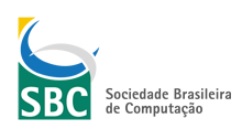A Framework for Reengineering AMPLIA Enviroment
Resumo
The AMPLIA – Probabilistic Multiagent Learning Environment is an educational tool aimed at creating an additional resource for assistance to medical education, supporting the development of diagnostic reasoning. The first version has some limitations when it comes to access only local network (LAN) as a function of applied technologies, and provide students with an unfriendly interface. The proposed framework aims to enable the use of Internet resources, and to propose an interface for a computer game, we developed a new technology framework that will enable the provision of knowledge to other university.
Referências
FERREIRA, Paulo André. DESENVOLVIMENTO DE SISTEMA DE INFORMAÇÃO WEB PARA O CONTROLE INTERNO DE PROTOCOLOS DA ESCOLA POLITÉCNICA DE PERNAMBUCO - ESCOLA POLITÉCNICA DE PERNAMBUCO. Disponível em: [link] Acesso em: jun. 2009
FIPA – Foundation For Intelligent Physical Agents. Disponível em [link] Acesso em: maio. 2010
FLORES, C. D. Fundamentos dos Sistemas Especialistas Organizado por: Dante Augusto Couto Barone Sociedades Artificiais: A Nova Fronteira da Inteligência nas Máquinas:ed. 1 ed., Porto Alegre:, Bookman (ArtMed), 2002, v. 1, p. 127-154.
FLORES, Cecília D. Negociação Pedagógica Aplicada a um Ambiente Multiagente de Aprendizagem Colaborativa. 2005. 121p. Tese (Doutorado em Ciência da Computação) – Instituto de Informática, PPGC / UFRGS, Porto Alegre.
GLUZ, J. C. A Biblioteca FACIL (FIPA-ACL Interface Library): Uma Avaliação das Plataformas de Comunicação FIPA e Especificação de uma Interface de Programação FIPA Independente de Linguagem de Programação. Porto Alegre: PPGC - Instituto de Informática - UFRGS, 2002 (Trabalho Individual em Nível de Doutorado).
GLUZ, J. C. Formalização de Comunicação de Conhecimentos Probabilísticos em Sistemas Multiagentes: Uma Abordagem Baseada em Lógica Probabilística. 2005. 237f. Tese (Doutorado em Ciência da Computação) – Instituto de Informática, UFRGS, Porto Alegre.
JADE. Java Agent Development Framework. Disponível em: [link] Acesso em: mar. 2009.
JDBC – API JDBC - Disponível em: [link] Acesso em: out. 2010.
LOZANO F. Persistência com Hibernate. Java Magazine, Ed. 28, p. 18-28, 2006.
MORAIS, A. M., et. al. Serious Games na Odontologia: Aplicações, Características e Possibilidades. In: XII Congresso Brasileiro de Informática em Saúde 2010. Porto de Galinhas/PE. Anais. 2010. CD-ROM.
MOSSMANN, J. B., MARONI, V.; DAHMER, A.; FLORES, C. D.; PINHO, M. VRMED: Linguagem de Domínio Específico para Ambientes Virtuais Aplicados à Educação Médica. In: XII Congresso Brasileiro de Informática em Saúde 2010. Porto de Galinhas/PE. Anais. 2010. CD-ROM.
NETBEANS. – NetBeans open-source and free IDE. Disponivel em: [link] . Acesso em: jul. 2010.
SEAMED. Sistemas especialistas para a área médica. Disponível em: [link] Acesso em: mar. 2010.
SILVA, Carolina Fernanda. - ANÁLISE E AVALIAÇÃO DO FRAMEWORK HIBERNATE EM UMA APLICAÇÃO CLIENTE/SERVIDOR. Disponível em : [link] em 15/10/2010 Acesso em: set. 2009.
SILVA, Leonardo Ayres de Morais. Estudo e Desenvolvimento de Sistemas Multiagentes usando JADE: Java Agent Development framework - Monografia de Conclusão de Curso - Universidade de Fortaleza – UNIFOR
SUN Microsystems. Java. Disponível em: [link]. Acesso em: 09 nov. 2008.



